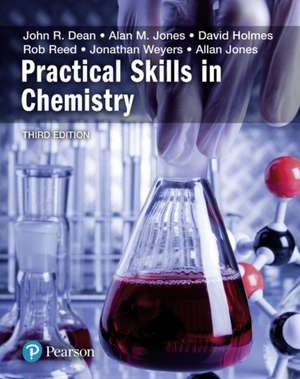Practical Skills in Chemistry: Practical Skills
Autor Alan Jones, Allan Jones, David Holmes, John Dean, Jonathan Weyers, Rob Reeden Limba Engleză Paperback – 21 sep 2017
Preț: 448.32 lei
Nou
Puncte Express: 672
Preț estimativ în valută:
85.80€ • 89.24$ • 70.83£
85.80€ • 89.24$ • 70.83£
Carte disponibilă
Livrare economică 24 martie-07 aprilie
Livrare express 07-13 martie pentru 76.96 lei
Preluare comenzi: 021 569.72.76
Specificații
ISBN-13: 9781292139920
ISBN-10: 1292139927
Pagini: 656
Dimensiuni: 220 x 277 x 38 mm
Greutate: 1.61 kg
Ediția:3. Auflage
Editura: Pearson Education
Seria Practical Skills
ISBN-10: 1292139927
Pagini: 656
Dimensiuni: 220 x 277 x 38 mm
Greutate: 1.61 kg
Ediția:3. Auflage
Editura: Pearson Education
Seria Practical Skills
Notă biografică
John R Dean is Professor in Analytical and Environmental Sciences at the University of Northumbria at Newcastle
Alan M Jones was Head of Chemical Sciences at the University of Northumbria at Newcastle,
David Holmes is Associate Dean of the Keith B. Taylor Global Scholars Programme, St George's University School of Medicine (Grenada), based at the University of Northumbria at Newcastle
Rob Reed is Adjunct Professor (Education & Science) at Central Queensland University, Australia
Jonathan Weyers is Honorary Senior Lecturer at the University of Dundee
Allan Jones is Chancellor's Award Fellow in Ecology, Environmental Science and Zoology at the University of Dundee.
Alan M Jones was Head of Chemical Sciences at the University of Northumbria at Newcastle,
David Holmes is Associate Dean of the Keith B. Taylor Global Scholars Programme, St George's University School of Medicine (Grenada), based at the University of Northumbria at Newcastle
Rob Reed is Adjunct Professor (Education & Science) at Central Queensland University, Australia
Jonathan Weyers is Honorary Senior Lecturer at the University of Dundee
Allan Jones is Chancellor's Award Fellow in Ecology, Environmental Science and Zoology at the University of Dundee.
Cuprins
Contents
List of boxes viii Preface to the second edition xi Guided tour xii For the student xiv Acknowledgements xv List of abbreviations xvi
Study and examination skills 1. The importance of transferable skills 2. Managing your time 3. Working with others 4. Taking notes from lectures and texts 5. Learning and revising 6. Curriculum options, assessments and exams 7. Preparing your curriculum vitae
Information technology and library resources 8. Finding and citing published information 9. Evaluating information 10. Using online resources 11. Internet resources for chemistry 12. Using spreadsheets 13. Word processors, databases and other packages
Communicating information 14. Organising a poster display 15. Giving a spoken presentation 16. General aspects of scientific writing 17. Writing essays 18. Reporting practical and project work 19. Writing literature surveys and reviews
Fundamental laboratory techniques 20. Your approach to practical work 21. Health and safety 22. Working with liquids 23. Basic laboratory procedures I 24. Basic laboratory procedures II 25. Principles of solution chemistry 26. pH and buffer solutions
The investigative approach 27. Making and recording measurements 28. SI units and their use 29. Scientific method and design of experiments 30. Project work
Laboratory techniques 31. Melting points 32. Recrystallisation 33. Solvent extraction 34. Distillation 35. Reflux 36. Evaporation 37. Inert atmosphere methods 38. Combinatorial chemistry
Classical techniques 39. Qualitative techniques for inorganic analysis 40. Gravimetry 41. Procedures in volumetric analysis 42. Acid-base titrations 43. Complexometric titrations 44. Redox titrations 45. Precipitation titrations
Instrumental techniques 46. Fundamental principles of quantitative chemical analysis 47. Calibration and quantitative analysis 48. Basic spectroscopy 49. Atomic spectroscopy 50. X-ray fluorescence spectroscopy 51. Chromatography - basic principles 52. Gas and liquid chromatography 53. Electrophoresis 54. Electroanalytical techniques 55. Radioactive isotopes and their uses 56. Infrared spectroscopy 57. Nuclear magnetic resonance spectroscopy 58. Mass spectrometry 59. Thermal analysis
Analysis and presentation of data 60. Using graphs 61. Presenting data in tables
62. Hints for solving numerical problems 63. Descriptive statistics 64. Choosing and using statistical tests 65. Drawing chemical structures 66. Chemometrics 67. Computational chemistry
Answers to study exercises Index
List of boxes viii Preface to the second edition xi Guided tour xii For the student xiv Acknowledgements xv List of abbreviations xvi
Study and examination skills 1. The importance of transferable skills 2. Managing your time 3. Working with others 4. Taking notes from lectures and texts 5. Learning and revising 6. Curriculum options, assessments and exams 7. Preparing your curriculum vitae
Information technology and library resources 8. Finding and citing published information 9. Evaluating information 10. Using online resources 11. Internet resources for chemistry 12. Using spreadsheets 13. Word processors, databases and other packages
Communicating information 14. Organising a poster display 15. Giving a spoken presentation 16. General aspects of scientific writing 17. Writing essays 18. Reporting practical and project work 19. Writing literature surveys and reviews
Fundamental laboratory techniques 20. Your approach to practical work 21. Health and safety 22. Working with liquids 23. Basic laboratory procedures I 24. Basic laboratory procedures II 25. Principles of solution chemistry 26. pH and buffer solutions
The investigative approach 27. Making and recording measurements 28. SI units and their use 29. Scientific method and design of experiments 30. Project work
Laboratory techniques 31. Melting points 32. Recrystallisation 33. Solvent extraction 34. Distillation 35. Reflux 36. Evaporation 37. Inert atmosphere methods 38. Combinatorial chemistry
Classical techniques 39. Qualitative techniques for inorganic analysis 40. Gravimetry 41. Procedures in volumetric analysis 42. Acid-base titrations 43. Complexometric titrations 44. Redox titrations 45. Precipitation titrations
Instrumental techniques 46. Fundamental principles of quantitative chemical analysis 47. Calibration and quantitative analysis 48. Basic spectroscopy 49. Atomic spectroscopy 50. X-ray fluorescence spectroscopy 51. Chromatography - basic principles 52. Gas and liquid chromatography 53. Electrophoresis 54. Electroanalytical techniques 55. Radioactive isotopes and their uses 56. Infrared spectroscopy 57. Nuclear magnetic resonance spectroscopy 58. Mass spectrometry 59. Thermal analysis
Analysis and presentation of data 60. Using graphs 61. Presenting data in tables
62. Hints for solving numerical problems 63. Descriptive statistics 64. Choosing and using statistical tests 65. Drawing chemical structures 66. Chemometrics 67. Computational chemistry
Answers to study exercises Index



